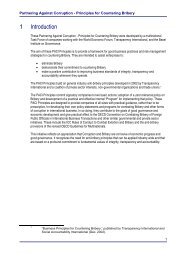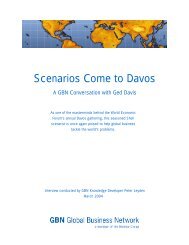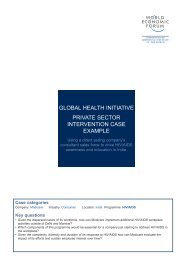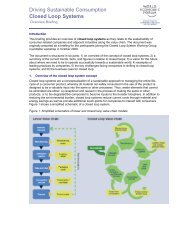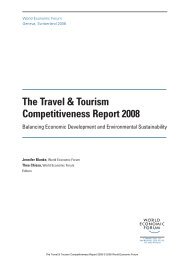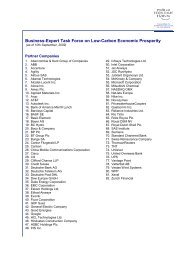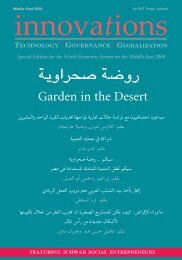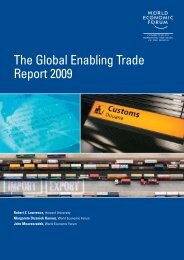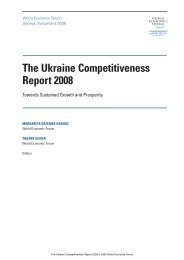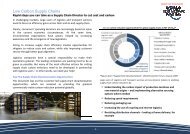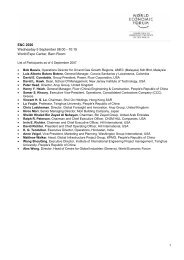The Travel & Tourism Competitiveness Report 2007 - World Economic ...
The Travel & Tourism Competitiveness Report 2007 - World Economic ...
The Travel & Tourism Competitiveness Report 2007 - World Economic ...
You also want an ePaper? Increase the reach of your titles
YUMPU automatically turns print PDFs into web optimized ePapers that Google loves.
Executive Summary<br />
xxviii<br />
relevance to the wider global economy. However, they<br />
point out that it is not clear whether these generally<br />
positive trends are leading to a genuinely fair competitive<br />
environment that will result in healthy and sustainable<br />
growth of the regional air transport sector. In this<br />
context, they call for progress in two areas.<br />
<strong>The</strong> first area concerns the Middle East, where the<br />
evolution of a group of states that is committed internally<br />
to fair competition is deemed crucial.<strong>The</strong> authors stress<br />
that a fair and sustainable air transport sector in the region<br />
is something that all Middle Eastern airlines should<br />
aspire to in the medium to long term, as they each have<br />
a stake in a balanced and correctly structured market.<br />
<strong>The</strong>y propose that those countries willing to agree to a<br />
fair competition environment should thus come together<br />
and campaign for comprehensive liberalization in the<br />
region.<strong>The</strong> second area, in parallel to the first, is the<br />
consideration that it is in the interests of nearby countries<br />
and regional blocs, such as the European Union, to<br />
support initiatives that lead to economically rational and<br />
stable outcomes. In this context, they call on the<br />
European Union to reconsider its current negotiating<br />
stance with regard to the further liberalization of ASAs,<br />
suggesting that it should deal differently with those<br />
states willing to engage in truly comprehensive negotiations<br />
within a framework of fair competition.<br />
In “Driving <strong>Tourism</strong> Growth through Consumer-<br />
Centric Marketing,” Brad Corrodi of Rosetta Marketing<br />
Group discusses how changes in the structure of travel<br />
distribution have opened up new opportunities for<br />
collaboration between the public and private sectors to<br />
achieve tourism development objectives. He describes<br />
how travel suppliers, tourist boards, and commercial<br />
intermediaries can radically improve the productivity of<br />
their marketing spending while accelerating sustained,<br />
profitable growth.<strong>The</strong> author draws on experiences<br />
with both government tourist boards and commercial<br />
travel companies to distill the core engine of sustainable<br />
tourism growth—a consumer awareness and experience<br />
“feedback loop.” Destinations must drive consumer<br />
awareness in key source markets, with consistent messaging<br />
and brand positioning—and then visitors to these<br />
destinations must find the experience consistent with<br />
the brand promise.<br />
Unfortunately, the author notes that there are many<br />
cases where substantial investments in destination infrastructure<br />
and tourism marketing have not led to such<br />
positive feedback “turbocharged growth,” and identifies<br />
five of the most common pitfalls. Most stem from the<br />
difficulty that public and private sectors have had in collaborating<br />
to define target consumer groups and creating<br />
effective marketing capabilities to reach them. As a<br />
result, tourism marketing has fallen far behind the levels<br />
of productivity achieved in other industries.<br />
However, Corrodi notes that over the last three<br />
years the structure of the travel distribution value chain<br />
has changed radically, opening new ways for multiple<br />
public and private stakeholders to collaborate in destination<br />
marketing. Rapid growth in consumers’ online<br />
travel research activity, increased transparency into the<br />
travel-buying process, and innovative new intermediary<br />
business models all make it much easier (and practical)<br />
for suppliers and government tourism ministries to<br />
develop consumer-marketing programs that take advantage<br />
of leading marketing techniques developed in<br />
other industries. Specific actions and enablers for such<br />
marketing programs are also identified. He concludes by<br />
stressing that the destinations that are able to work<br />
together with a broad range of stakeholders toward a<br />
common set of marketing objectives will likely be the<br />
ones to ensure that the tourism sector delivers its substantial<br />
social and economic development potential, as<br />
Google and others turn travel consumer access into a<br />
true global marketplace.<br />
Part 2 of the <strong>Report</strong> is a comprehensive data section<br />
that includes country/economy profiles for each of the<br />
124 economies covered, as well as data tables for each of<br />
the individual variables used to assess national T&T<br />
competitiveness. Each section is preceded by a description<br />
of how to interpret the data provided.Technical<br />
notes, included at the end of Part 2, provide details on<br />
the characteristics and sources of the individual hard<br />
data variables included in the <strong>Report</strong>.<br />
Notes<br />
1 UNWTO, Historical Perspective of <strong>World</strong> <strong>Tourism</strong>, available online at<br />
http://www.unwto.org/facts/menu.html.<br />
2 WTTC 2006a.<br />
3 UNWTO, Historical Perspective of <strong>World</strong> <strong>Tourism</strong>, available online at<br />
http://www.unwto.org/facts/menu.html.<br />
4 2006 <strong>Tourism</strong> Satellite Accounting research of the <strong>World</strong> <strong>Travel</strong> &<br />
<strong>Tourism</strong> Council (WTTC) and Accenture.<br />
5 See UNCED (1992).<br />
References<br />
UNWTO (<strong>World</strong> <strong>Tourism</strong> Organization). Historical Perspective of <strong>World</strong><br />
<strong>Tourism</strong>. Available at www.unwto.org/facts/menu.html.<br />
WTTC (<strong>World</strong> <strong>Travel</strong> & <strong>Tourism</strong> Council). 2006a. Breaking Barriers:<br />
Managing Growth, November 6. London: WTTC Media and<br />
Resource Centre. Available at www.wttc.org/news135.htm<br />
———. 2006b. <strong>Tourism</strong> Satellite Accounting research of the <strong>World</strong><br />
<strong>Travel</strong> & <strong>Tourism</strong> Council (WTTC) and Accenture.<br />
UNCED (United Nations Conference on Environment and<br />
Development). 1992. Agenda 21 Programme of Action. Earth<br />
Summit June 3–14, Rio de Janeiro.



